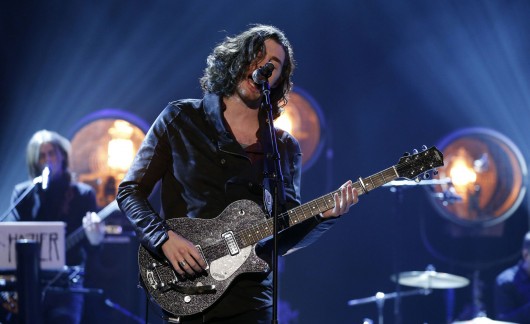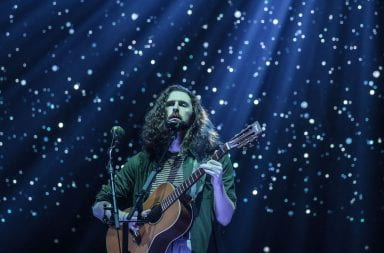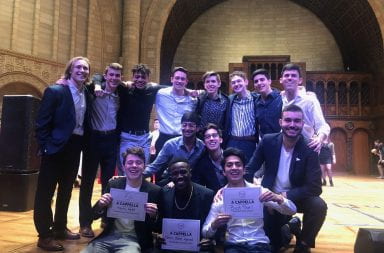
Hozier performs during filming of ‘The Graham Norton Show’ at the London Studios, in central London, UK, on Jan. 7, 2015. Credit: Courtesy of TNS
It’s incredible how much things can change in six months. Back at the end of August, there’s a good chance you had never heard of Andrew Hozier-Byrne, known by his stage name of Hozier. Back then he was simply an Irish artist about to release his first LP — just another drop in the bucket that is the global music scene in the internet age.
Friday night, however, was much different. The golden-voiced yet soft-spoken 24-year-old came to Columbus for the first time to sing to all those fans he’s gained in the past months — and the results were extraordinary.
Backed by the success of one of the biggest viral hits of 2014, “Take Me To Church,” Hozier’s been everywhere since his album dropped in early September: performing among angels at the Victoria’s Secret fashion show, singing in the background of a LeBron James commercial and dueting with Annie Lennox at this month’s Grammys. If ubiquity means success, Hozier has got it.
He’d successfully whipped the crowd at the LC Pavilion into a frenzy before he even arrived on stage, but he more than made up for the wait, getting straight into his set and performing three songs before ever stopping to talk to the audience. Those three each had a kinetic energy which has made his eponymous album so successful. First there was one of his bluesiest tracks, “Angel of Small Death and the Codeine Scene,” followed by the pleading emotions of “From Eden.”
He then belted out “Jackie and Wilson” — a personal favorite — named for the legendary American rhythm and blues singer. It’s quite obvious that artists like Wilson form the core of Hozier’s influences. If you didn’t know he was Irish, you could safely assume his deep timbre was borne out of the American South. Indeed, it’s hard to find a review of his music that doesn’t mention the gold standard of R&B-influenced Irish soul, Van Morrison. Like Morrison’s later (and less acclaimed) music, Hozier’s songs already hold religious themes, whether it be in lyrics — like in “Church” or “Eden” — or in thier general tone. But even with that similarity, the Irishman that Hozier reminds me of most is the poet William Butler Yeats, only if he had spent his childhood in Shreveport, not Sligo.
As Hozier started to dig into his album it became apparent that most of the crowd might have already heard all the songs they knew, but that didn’t temper their enthusiasm. They clapped along to “Someone New,” nodded their heads to “To Be Alone,” before being blown away, as I was, by the artist’s duet with his cello player Alana Henderson as they crooned to “In A Week.”
Through the course of the evening, the Leinster native had time for two covers from very different time periods. He went solo on “Illinois Blues,” a song from 1931 by Skip James, and then gave his own take on Amerie’s “1 Thing.”
Those concertgoers waiting for “Church” finally got their wish during the final song of Hozier’s main set. Despite being a song that both performer and audience have heard too many times, neither wavered in their ferocity during this rendition. I can only imagine what the crowd will sound like when he returns to the same venue in June.
The whole evening served to confirm what I had already expected: Hozier is just a normal guy like you or me, with the humble nature that says, “I still don’t know how this is happening to me.” At one point in almost every song, two Irish girls in front of me would wave the country’s tricolor flag up, hoping for a response. When he finally did see it, he could only muster a chuckle and a big smile. He looked absolutely chuffed.
That unassuming demeanor could still leave him when it needed to, as it did in his encore’s final tune, “Work Song.” The track could easily be described as powerful, and most of that is down to the singer. The slow chorus was reminiscent of the responsorial psalms I’ve heard in church down the years, only Hozier didn’t have to raise his hand to get everyone to sing. In any case, he had put me back in a pew. His hit song had come full circle.
As he sang the chorus for the final time, the relevance of the lyrics to Hozier’s career trajectory was obvious: “When my time comes around / Lay me gently in the cold dark earth.” In the song he’s referring to his demise, but in real life his time has also come — only in a much more positive way.


